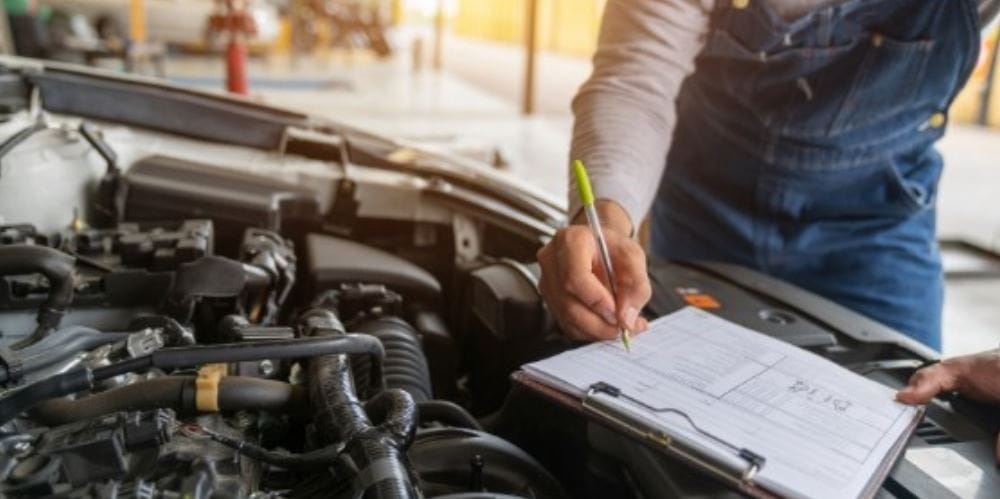6 Reasons Your Car May Be Leaking

Have you ever gone out to your garage and noticed a large puddle underneath your car? Before you freak out, you have to find out if the fluid on the ground is typical or if it means you need to take your vehicle to the mechanic. No matter if you’re an automotive geek or someone new to the car industry, it can be difficult to diagnose a leakage. Knowing how to diagnose a car leak is an important aspect of owning a vehicle.
Different Kinds of Car Leakage
Before you start self-diagnosing your car, you need to have a good understanding of what fluids have the potential to leak and how to determine which one is the cause.
Oil Leaking
One of the most common issues your car may experience is an oil leak. If your car has been parked for a while and you notice a dark brown or yellow puddle underneath your car, it could be that the car is leaking oil. There could be many reasons your car has an oil leak; here are some of the most common causes:
- Your engine gasket is degraded
- The oil pan has a hole
- You have a corroded or broken oil seal
- The oil filter is worn out
- The filler cap is missing or broken
- Poor connection on the valve gasket
Depending on your comfortability, you can crawl underneath your car to check most of these issues out, or you can ask a mechanic for help. Be prepared before you head into the mechanic, because oil leaks tend to be fairly expensive to fix.
Regular maintenance and routine oil changes can eliminate the problems outlined above, as well as prevent oil leaks before they happen. It’s also important to buy good, name-brand oil from a reputable company. If you can, try to choose synthetic oil. Thankfully, if you notice the car is leaking oil, you can still drive it to the mechanic and don’t usually need a tow truck.
Transmission Fluid Leak
If you notice a red or brown fluid that is viscous in texture, it could be your car’s transmission fluid. When your car is in the parked position, you may notice that the transmission fluid leak is usually spotted on the ground in the middle of the car. You should monitor your car after a transmission fluid change in case they made a mistake. However, that is not the only reason a car may be leaking this kind of fluid. Causes of a transmission fluid leak could be:
- A cracked pan gasket
- Debris on the road
- An issue with the torque converter
- The pan isn’t secured properly after a transmission fluid change
If a transmission fluid leak develops in your system, and you continue to drive, you can permanently damage your car's transmission leading to costly repairs or replacements.
Brake Fluid Leak
Brake fluid can be a little more difficult to diagnose because it can range from clear to light brown. It is a thin, oily texture and is often located near the wheels or passenger side of the vehicle. A brake fluid leak is extremely serious and needs to be attended to immediately. Some common causes of your car leaking brake fluid are:
- One of the rubber hoses, brake calipers, wheel cylinders, or master cylinders could be leaking
- Worn brake pads or shoes causing caliper seal failure
- Loose bleeder valves
Since a brake fluid leak is serious, you should cease driving and call a tow truck. You should take your car to the mechanic if you notice that the brake pedals feel strange when you press down, the brake pedal goes down too far, you see visible fluid coming out, or your car has difficulty stopping.
Antifreeze Leak
One of the most distinct leaks you may notice under or around your vehicle is a green, pink, or yellow sticky substance, which may indicate an antifreeze leak. This is a moderate to a severe issue that should be dealt with promptly. A few different factors that can cause an antifreeze leak are:
- A blown head gasket can allow your coolant and engine oil to mix or leak outside
- Corrosion of your radiator tubes
- A hole in your radiator
- Damage due to road debris can create a leak
- Wear and tear on your sealing gasket
- Worn out hose, which can get hard and brittle
Leaving an antifreeze leak untreated can lead to serious complications such as engine failure or overheating. Antifreeze is essential for your vehicle because it protects your engine from overheating. Your car utilizes antifreeze by taking the heat that is produced from your engine and pushing outside air through your radiator to cool the engine.
Power Steering Leak
Another fluid that can be dangerous to leave unattended is a power steering leak. Power steering leaks are typically sighted towards the front of the vehicle and can be a red or brown color. The drip is usually thin. A few causes of a power steering leak are:
- Your car’s o-rings and seals lose mass/form due to age
- If the o-rings break up into chunks that circulate in the fluid due to mileage
If your car has significant mileage or it is older, it may be prone to power steering leaks. You may notice a power steering leak if you are having difficulty turning your wheel while driving. This is because the power steering fluid levels are not high enough to be pressurized. Another sign is if your vehicle makes a low noise when you turn the wheel. Power steering leaks must be attended to right away before it has time to get worse.
Water Leaking
Water leaks are one of the most common fluids you may experience while owning a car. Some of the most common causes of a water leak are:
- The exhaust system
- The air conditioner leaking water
- The windscreen washer system
If you notice a clear and odorless fluid underneath your car, then it's probably from your car's air conditioning system. The air conditioning system of your car is the most common source of a water leak; thankfully, it is usually not serious. An air conditioner leaking water may indicate that your AC unit is clogged or dry. You will want to notify your mechanic, but you can still drive and should not have any major issues.
How to Check if Your Car is Leaking

If you’re worried that your car may be leaking an unknown fluid, it’s important to notice a few different things:
- Where is the leak located under your vehicle?
- What does the fluid look like, and what do you think it is?
- How comfortable are you with routine car maintenance?
- What other signs have you noticed the past few weeks?
If you can answer all of these competently, you may be able to fix the leak on your own. However, calling your local mechanic to discuss the signs you’ve noticed while driving is important for getting an accurate diagnosis. Oil leaks are one of the easier leaks to fix compared to power steering and transmission fluid leaks.
What to do if You Find a Leak

If you find a spill near your car, first look for other mechanical items nearby. If your lawnmower or snow blower are in close proximity, they may be the culprit of the leak. First, take a picture of the fluid and write down the texture, smell, and color. Then, you will want to clean it up to avoid pets or children from ingesting the liquid, as well as prevent slips. Learn how to clean up a car fluid leak effectively and safely:
- Cleaning up an oil leak: If the leak is still fresh, sprinkle baking soda over it to absorb the oil. Once dry, wet the stain with water and scrub it with a decent amount of force. Use a paste made up of half baking soda and half water. Once finished, rinse off the area and let it air dry by opening windows or using a fan.
- Cleaning up a transmission fluid leak: You can remove the stain by covering the area with oven cleaner and let that sit for 10 to 15 minutes. Once it has had a chance to set, grab a stiff brush and scrub the spot, then rinse the area with a high-pressure hose.
- Cleaning up an antifreeze leak: Cover the coolant with sand, kitty litter, or a professional-grade absorbent. Once the antifreeze has been fully absorbed, put on a pair of rubber gloves because the coolant can be harmful to your skin. Proceed to wipe up the absorbent material using paper towels and place them in a trash bag to avoid contamination.
Why Regular Car Check-Ups are Important

Regular car maintenance checks are crucial for being a smart owner. Regular check-ups help prevent future issues from occurring. The mechanic can measure fluid levels, check regular functions, and tire pressure to catch problems early. Depending on what type of vehicle you own, you should take your car into a service center every three to six months, or 3,000 to 5,000 miles. This is a good time to get an oil change, get a tire rotation, and check other fluid levels.
Maintenance Includes Insuring Your Ride

Many people think car maintenance means checking your oil or replenishing your windshield wiper fluid; however, being a smart owner means insuring your ride in case of an accident. Being a safe driver not only means taking your car into the mechanic for regular check-ups but also means you should choose an auto insurance plan that fits your budget and lifestyle.
If you’re in the market for full coverage auto insurance, check out our plans via our website or give one of our insurance agents a call at 602-922-3595. We are happy to help you learn more about our plans. Don’t wait, become a safe, insured driver today.






